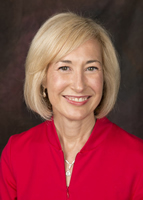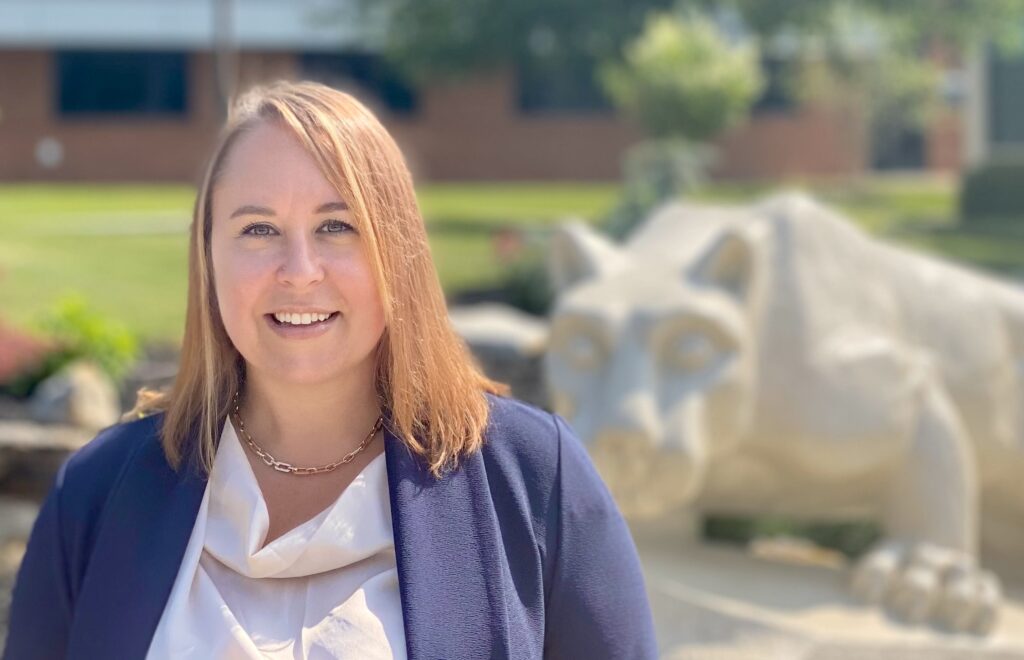
Marie Hardin was the featured speaker at the Penn State World Campus Fall Graduation Celebration in December. A reporter at heart, Hardin is the dean of the Penn State College of Communications, active in research in the field of sports journalism, and loves interacting with students. We recently sat down with her to talk about her message for our graduates and current students, as well as her rich love of journalism. Here’s our conversation:
Could you provide our readers with a sense of your teaching and educational background?
I grew up wanting to be a journalist! I joined the school newspaper in the fifth grade and that experience sparked the remainder of my career ambitions. At the top of my agenda was advising a college newspaper and teaching young people about the field of journalism. During my first night of classes as I was getting my master’s degree, I looked at my professor and had a light-bulb moment. He had a really cool job and one that I thought I could do. I quickly realized that I wanted to teach and help future students have a powerful and joyful college experience. Over the years, I’ve had a variety of journalism and teaching positions that focused around my original plan of working with young adults.
I joined Penn State University in 2003 and was attracted to the University because of its program in sports journalism. I’ve taught classes that focus on sports and society at the undergraduate and graduate levels. My research concentrates on diversity, ethics and professional practices in mediated sports. I was named dean of the College of Communications in July 2014.
What first attracted you to the field of journalism?
I was a shy, introverted kid, and the idea of being a journalist helped me to overcome that shyness. I realized that a journalist’s notebook was an entrée to everywhere and could really open doors for me. Through my experiences interviewing folks for stories, I had an excuse to put my shyness aside. I was able to ask questions and learn from people without hesitation. It was a great feeling!
How has journalism changed over the past 5, 10, 15, 20 years? How will these changes impact the future of journalism?
The field of journalism is much more interactive in 2015. The relationships between journalists and the public is a much more engaged conversation that can present great opportunities for stories to be told. We can see today that when a reporter posts a story online in the morning hours, that the story has the potential to change as the day progresses—and that progression can stem from the public’s input. There are so many more channels for the public to make connections with journalists—chat rooms, social media, etc. offer many open communication venues for storytelling. These connections can sometimes present a variety of ethical considerations for the field of journalism—but that’s nothing new to the field.
You’ve focused your research on sports journalism. Could you talk a little bit about that (sports journalism or her choice of focus)?
I was a high school and college athlete, so sports journalism was always something that I had a personal interest in learning more about. When you look at any newsroom, you can quickly realize that the sports department is a big part of it. Yet, somehow at the point in which I was pursuing my interest in the field, there wasn’t a lot of research being done in sports journalism. Now you can see that the field has grown dramatically over the past 15 years. There are so many angles to research in sports journalism, from gender and sports coverage to ethical/social/political issues. It’s interesting to think about how sports intersects with family, church, media, education, and attitudes on social issues.
Can you tell us about your experiences with online education?
In 2001, I taught my first online course. It was intriguing to me and it made me want to explore other courses that could be transitioned to the online course environment.
When I hear rumblings that people think online courses don’t offer the same educational experience as residential instruction courses—I tell them to take or teach an online course! Online courses are a rigorous and valuable experience for both students and teachers. A course should be engaging and powerful to students in either setting—in person and online—it shouldn’t matter!
You will be our featured speaker at the Penn State World Campus Fall Graduation Celebration. What can we expect your main message to be?
My message to graduates at the Penn State World Campus Fall Graduation Celebration will be to celebrate the end of their huge accomplishment, but yet to realize that this milestone marks an even bigger beginning for them. This degree will be the springboard to new opportunities for the rest of their lives. Penn State World Campus graduates have had the self-discipline and made smart decisions along the way, and those accumulations of small victories will serve them well in the future.
What type of encouragement would you lend to our current students as they work toward graduation?
Every small decision to invest in your future adds up to a great moment to celebrate. On this journey, you may make a not-so-smart decision every once in a while. You might decide to stay up late to watch your favorite TV show instead of studying for an exam as you should, but you’ve got to know that everyone does this! Just because you made one small slip or break in your routine doesn’t mean you are setting yourself into a pattern. The next day you can make a different decision to turn it around. Do that.
What’s the one impression of your college you’d like to leave with our Penn State World Campus students?
Penn State’s College of Communications has great teachers who know how to provide the fundamental knowledge and skills for our students. We understand and make sure that our students are treated as individual learners with sensitivity to their strengths, weaknesses, and aspirations. We want our students to keep their eyes on their big goals. It’s what sparks our passion for teaching.
What’s your favorite part of being a Penn Stater?
I’m part of a great institution made from our past, present, and future generations of students. Penn State makes us all a great story. Our Penn State World Campus students extend our story around the world. They are our ambassadors in the field with a strong level of motivation to succeed. I’m so proud of them.
What makes you smile?
I love interacting with students about their future goals and projects. Any opportunity that I have to engage with a student is one that I will gladly take.

